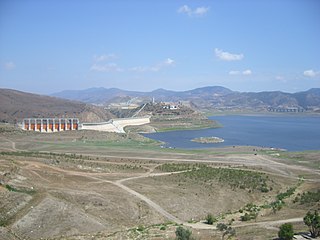Related Research Articles

The Great Molasses Flood, also known as the Boston Molasses Disaster, occurred on January 15, 1919, in the North End neighborhood of Boston, Massachusetts. A large storage tank filled with 2.3 million US gal (8,700 m3) weighing approximately 13,000 short tons (12,000 t) of molasses burst, and the resultant wave of molasses rushed through the streets at an estimated 35 mph (56 km/h), killing 21 and injuring 150. The event entered local folklore and residents claimed for decades afterwards that the area still smelled of molasses on hot summer days.

The Tijuana River is an intermittent river, 120 mi (195 km) long, near the Pacific coast of northern Baja California state in northwestern Mexico and Southern California in the western United States. The river is heavily polluted with raw sewage from the city of Tijuana, Mexico.

PepsiCo, Inc. is an American multinational food, snack, and beverage corporation headquartered in Harrison, New York, in the hamlet of Purchase. PepsiCo's business encompasses all aspects of the food and beverage market. It oversees the manufacturing, distribution, and marketing of its products. PepsiCo was formed in 1965 with the merger of the Pepsi-Cola Company and Frito-Lay, Inc. PepsiCo has since expanded from its namesake product Pepsi Cola to an immensely diversified range of food and beverage brands. The largest and most recent acquisition was Tropicana Products in 1998 and the Quaker Oats Company in 2001, which added the Gatorade brand to the Pepsi portfolio.

Tropicana Products, Inc. is an American multinational company which primarily makes fruit-based beverages. It was founded in 1947 by Anthony T. Rossi in Bradenton, Florida. Since 1998, it has been owned by PepsiCo. Tropicana's headquarters are in Chicago. The company specializes in the production of orange juice.

Thames Water Utilities Ltd, known as Thames Water, is a large private utility company responsible for the public water supply and waste water treatment in most of Greater London, Luton, the Thames Valley, Surrey, Gloucestershire, north Wiltshire, far west Kent, and some other parts of England; it has a considerable local monopoly. Thames Water is the UK's largest water and wastewater services company, and supplies 2.6 billion litres of drinking water per day, and treats 4.7 billion litres of wastewater per day. Thames Water's 15 million customers comprise 27% of the UK population.

Juice fasting, also known as juice cleansing, is a fad diet in which a person consumes only fruit and vegetable juices while abstaining from solid food consumption. It is used for detoxification, an alternative medicine treatment, and is often part of detox diets. The diet can typically last for two to seven days and involve a number of fruits and vegetables and even spices that are not among the juices typically sold or consumed in the average Western diet. The diet is sometimes promoted with implausible and unsubstantiated claims about its health benefits.

Naked Juice is an American brand that produces juices and smoothies. The company is based in Monrovia, California and is owned by PepsiCo. Naked Juice Co. of Glendora, Inc. operates as a subsidiary of PepsiCo, Inc. The first Naked Juice drink was produced in 1983 and sold in California under the name "Naked Juice", referring to the composition of no artificial flavors, added sugar, or preservatives. Distribution has since expanded, and Naked Juice products are distributed in the United States, as well as in Canada, the United Kingdom, the Netherlands and France, among others.

Wimm Bill Dann OJSC is one of Europe's largest dairy products companies. The company is headquartered in Moscow, Russia. WBD produces yogurt, milk, flavored milk, fruit juices, and other soft drinks. It holds a 34% share in all dairy products in Russia, and a 20% share of the fruit drink market.

Lebedyansky is a Russian multi-national company that manufacturers fruit juice, baby food, vegetable juice, and soft drinks. The company is owned by PepsiCo, and is the largest fruit juice manufacturer in Eastern Europe and the sixth largest in the world. Lebedyansky has two major production centers, both located in the Lipetsk Oblast.

Lebedyan is a town and the administrative center of Lebedyansky District in Lipetsk Oblast, Russia, located on the upper Don River, 62 kilometers (39 mi) northwest of Lipetsk, the administrative center of the oblast. Population: 21,012 (2010 Census); 22,966 (2002 Census); 22,850 (1989 Census).

The Martin County coal slurry spill was a mining accident that occurred after midnight on October 11, 2000, when the bottom of a coal slurry impoundment owned by Massey Energy in Martin County, Kentucky, broke into an abandoned underground mine below. The slurry came out of the mine openings, sending an estimated 306 million US gallons of slurry down two tributaries of the Tug Fork River. By morning, Wolf Creek was oozing with the black waste; on Coldwater Fork, a 10-foot-wide (3.0 m) stream became a 100-yard (91 m) expanse of thick slurry.

The London Beer Flood was an accident at Meux & Co's Horse Shoe Brewery, London, on 17 October 1814. It took place when one of the 22-foot-tall (6.7 m) wooden vats of fermenting porter burst. The pressure of the escaping liquid dislodged the valve of another vessel and destroyed several large barrels: between 128,000 and 323,000 imperial gallons of beer were released in total.

The 1949 Florida hurricane, also known as the Delray Beach hurricane, caused significant damage in the southern portions of the state late in the month of August. The second recorded tropical cyclone of the annual hurricane season, the system originated from a tropical wave near the northern Leeward Islands on August 23. Already a tropical storm upon initial observations, the cyclone curved west-northwestward and intensified, becoming a hurricane on August 25. Rapid intensification ensued as the storm approached the central Bahamas early on August 26, with the storm reaching Category 4 hurricane strength later that day and peaking with maximum sustained winds of 130 mph (215 km/h) shortly after striking Andros. Late on August 26, the storm made landfall near Lake Worth, Florida, at the same intensity. The cyclone initially weakened quickly after moving inland, falling to Category 1 status early the next day. Shortly thereafter, the system curved northward over the Nature Coast and entered Georgia on August 28, where it weakened to a tropical storm. The storm then accelerated northeastward and became extratropical over New England by August 29. The remnants traversed Atlantic Canada and much of the Atlantic Ocean before dissipating near Ireland on September 1.

An industrial accident at a caustic waste reservoir chain took place at the Ajkai Timföldgyár alumina plant in Ajka, Veszprém County, in western Hungary. On 4 October 2010, at 12:25 CEST (10:25 UTC), the northwestern corner of the dam of reservoir number 10 collapsed, freeing approximately one million cubic metres of liquid waste from red mud lakes. The mud was released as a 1–2 m (3–7 ft) wave, flooding several nearby localities, including the village of Kolontár and the town of Devecser. Ten people died, and 150 people were injured. About 40 square kilometres (15 sq mi) of land were initially affected. The spill reached the Danube on 7 October 2010.

Evolution Fresh, a subsidiary of Starbucks Corporation, is an American-based company producing fruit juices, fruit smoothies, gourmet soups, salads and signature bowls.
In September 2013, 1,400 tons of molasses spilled into Honolulu Harbor. The spill was discovered on 9 September 2013. It was caused by a faulty pipe, for which the shipping company Matson Navigation Co. took responsibility. Molasses is an unregulated product, and neither Matson nor government officials had a contingency plan to respond to a molasses spill. Natural currents and weather were expected to eventually dilute and flush the molasses out of the harbor and a nearby lagoon.

The 2017 California floods were a series of floods that affected parts of California in the first half of 2017. Northern California saw its wettest winter in almost a century, breaking the previous record set in the winter of 1982–83. Flooding related to the same storm systems also impacted parts of western Nevada and southern Oregon. Damage to California roads and highways alone was estimated at over $1.05 billion.
References
- ↑ "Кисельные берега: в Лебедяни произошло наводнение из тысяч литров сока" [Sour shores: a flood of thousands of liters of juice occurred in Lebedyan]. Moskovsky Komsolets (in Russian). April 25, 2017. Retrieved November 11, 2018.
- 1 2 Smith, Geoffrey (April 25, 2017). "A Pepsi Warehouse in Russia Just Collapsed and Flooded a Town". Fortune. Retrieved November 11, 2018.
- ↑ McDougall, Zoey (April 26, 2017). "Town flooded by 28 million litres of Pepsi after soft drink factory collapse". Mirror. Retrieved November 11, 2018.